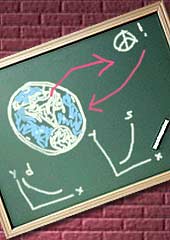
Takeaways
- China has a long history of standardized tests, beginning with the ancient imperial exams initiated during the Sui Dynasty.
- Chinese students are taught that all questions have but one right answer and there is little room for debate.
- Chinese students develop what appears to many Westerners to be a shocking capacity for memorization.
- In China, there is an increasing desire to make education more American. The lack of creativity in education will soon prove a major stumbling block in her development.
- Chinese students achieve near perfect scores on Western standardized exams. But when go abroad, they find themselves ill prepared for the education.
It’s a rainy afternoon in downtown Shanghai. The streets are empty of pedestrians, except for a group of parents waiting outside a school beneath a canopy of umbrellas.
At four o’clock, the kids emerge — all neatly dressed in blue school uniforms with red neck scarves and book bags so heavy some use suitcase wheels to carry them. One day soon, my son will be among them.
Though the city’s expat suburbs are filled with international schools offering curricula from Britain, Germany, Singapore and the United States, an increasing number of foreigners — like us — are determined to send their children to local schools.
The decision is partly based on an inability — or unwillingness — to spend thousands of dollars in tuition fees, especially given the suspicion that local schools are better anyway. After all, what more could one want from a basic education than a strong grounding in language, math and science, all subjects in which Asian schools famously excel.
Our main concern is the ability of our son — and indeed the whole family — to adapt to the strict diligence that is expected of the Chinese. Apprehension increases when talking to local friends.
When Rousseau Chen, a Shanghainese father, wanted to take his 14-year-old daughter Shelly on holiday, for example, she refused.




